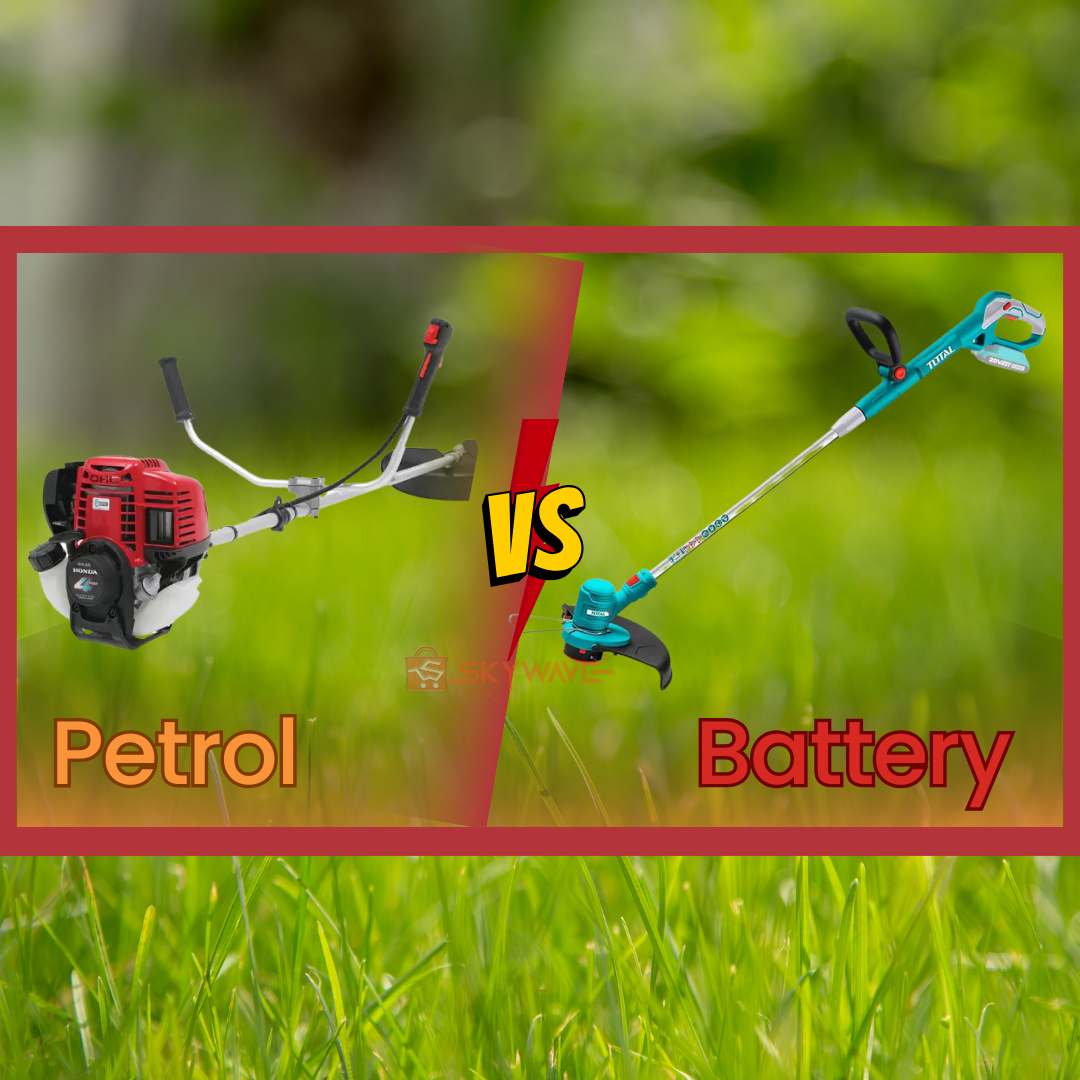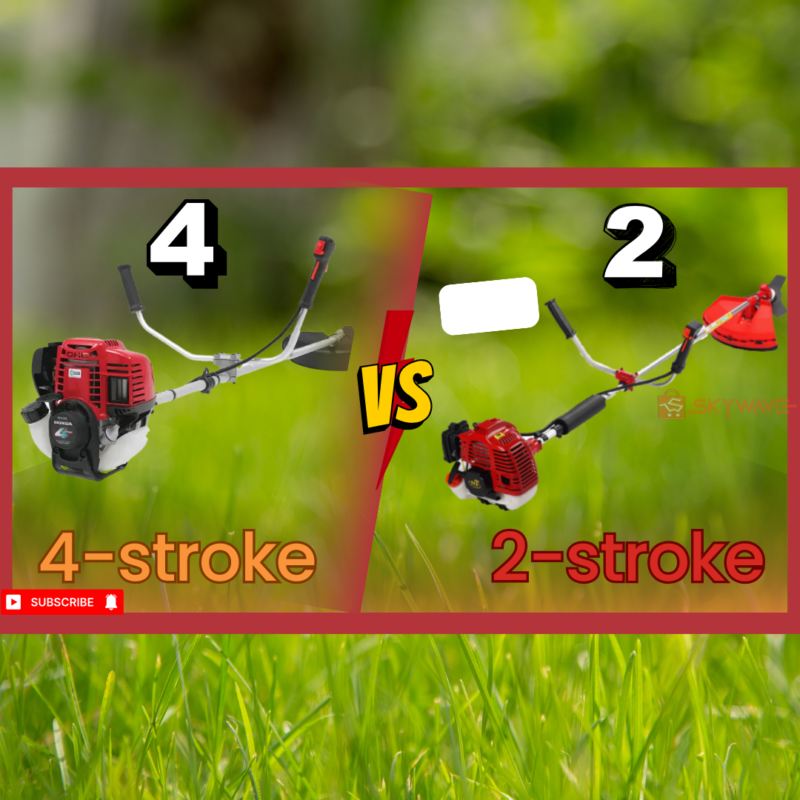Battery and Petrol Brush Cutters: Understanding the Key Differences

Introduction
Brush cutters are essential tools in landscaping, gardening, and agricultural maintenance. They are designed to tackle tough vegetation that regular lawnmowers and trimmers can’t handle. With powerful cutting capabilities, brush cutters can efficiently clear dense undergrowth, tall grass, and even small trees, making them indispensable in maintaining large areas of land. As we delve deeper into the comparison between battery and petrol brush cutters, it is crucial to understand their fundamental roles and differences. By examining their features, performance, and suitability for various tasks, we can make informed decisions on which type best meets our specific needs in landscaping and maintenance projects.
Battery and Petrol Brush Cutters
The basic functionality of a brush cutter revolves around its robust motor and sharp, rotating blades or cutting attachments. These tools are equipped to handle various cutting tasks, thanks to their interchangeable heads that can accommodate different types of blades, from metal to nylon. This versatility allows users to switch between trimming grass, cutting weeds, and even pruning branches, depending on the specific gardening or landscaping needs. Brush cutters are categorized into two main types which are battery and petrol brush cutters
Battery brush cutters – These are known for their convenience and ease of use, as they are cordless and typically lighter, making them ideal for smaller yards and gardens.
Petrol brush cutters – They are renowned for their power and endurance, capable of handling more demanding tasks and larger areas without the need for frequent recharging or refueling.
The importance of brush cutters in maintaining outdoor spaces cannot be overstated. They not only enhance the aesthetic appeal of gardens and landscapes by keeping vegetation under control but also help prevent the spread of pests and diseases by removing overgrown and unhealthy plants. Additionally, in agricultural settings, brush cutters assist in preparing land for planting and maintaining pathways for easier access.
Battery Brush Cutter: Features and Advantages
A battery brush cutter is an innovative gardening tool powered by rechargeable batteries, designed to manage overgrown lawns and dense vegetation with ease. Unlike traditional petrol brush cutters, battery brush cutters operate on electric power, making them a more environmentally friendly option. The core components of a battery brush cutter include the electric motor, battery pack, cutting head, and control handle, all of which work together to offer a seamless cutting experience.
Eco-friendliness – One of the primary advantages of battery brush cutters is their eco-friendliness. They produce zero emissions, making them an ideal choice for environmentally-conscious users. Additionally, battery brush cutters are significantly quieter than their petrol counterparts, which reduces noise pollution and makes them suitable for use in noise-sensitive areas.
Ease of maintenance – Another notable benefit is the ease of maintenance. Battery brush cutters require minimal upkeep compared to petrol-powered models, as they do not have engines that need regular servicing. The absence of fuel and oil changes further simplifies maintenance, saving both time and effort. Furthermore, the lightweight design of battery brush cutters enhances user comfort, reducing fatigue during extended periods of use.
Battery brush cutters are a compelling choice for those seeking a quiet, low-maintenance, and environmentally friendly solution for their gardening needs. Their advantages make them well-suited for residential use, particularly in urban settings where noise and emissions are of greater concern.
Petrol Brush Cutter: Features and Advantages
A petrol brush cutter, also known as a gas-powered brush cutter, is a robust tool designed for extensive and demanding landscaping tasks. Unlike its battery-operated counterpart, a petrol brush cutter relies on a combustion engine, typically fueled by a mix of petrol and oil. Key components include the engine, fuel tank, cutting head, and a sturdy shaft that connects the various parts, providing durability and stability during operation.
Powerful Performance – One of the primary advantages of a petrol brush cutter is its powerful performance. These machines are specifically designed for heavy-duty tasks, making them ideal for large properties, professional landscaping, and agricultural use. The substantial power output allows for continuous operation without the need for frequent pauses, unlike battery-operated models that require recharging. This longer operational time is particularly beneficial for extensive projects where efficiency is crucial.
Battery and Petrol Brush Cutter Main Differences
Below is a table summarizing the main differences between battery and petrol brush cutters.
| Feature | Battery Brush Cutter | Petrol Brush Cutter |
|---|---|---|
| Power Source | Rechargeable Battery | Gasoline |
| Noise Level | Quieter | Louder |
| Maintenance | Low | High |
| Operational Time | Limited by battery life | Continuous with fuel |
| Environmental Impact | Eco-friendly | Produces emissions |
| Cost | Higher initial cost, lower long-term cost | Lower initial cost, higher long-term cost |
Choosing the Right Brush Cutter: Factors to Consider
When deciding between the battery and Petrol Brush Cutters, several factors need to be taken into account to ensure you select the most suitable tool for your needs. These factors include:
1. Size of the area
One of the primary considerations is the size of the area you intend to maintain. Battery brush cutters are generally well-suited for smaller to medium-sized areas due to their limited run time and power constraints. In contrast, petrol brush cutters can handle larger spaces more efficiently, thanks to their higher power output and longer operational duration.
2. Type of Vegetation
The type of vegetation also plays a significant role in your decision. For lighter tasks such as trimming grass and small weeds, a battery brush cutter might be sufficient. However, for dealing with dense underbrush, thick grass, or tougher vegetation, a petrol brush cutter is usually the better choice due to its superior power and cutting capabilities.
3. Eco-friendliness
Environmental concerns are increasingly important for many users. Battery brush cutters are generally more eco-friendly, producing no direct emissions and operating at lower noise levels, which is beneficial in residential areas or noise-sensitive environments. On the other hand, petrol brush cutters do emit exhaust gases and are typically louder, making them less favorable from an environmental standpoint.
4. Budget
Budget is another crucial factor to consider. While battery brush cutters tend to have a higher upfront cost due to the price of batteries and chargers, they often have lower ongoing maintenance costs. Petrol brush cutters might be cheaper initially, but they require regular fuel, oil changes, and more frequent maintenance, which can add up over time.
User experience and convenience are also worth weighing. Battery brush cutters are generally lighter and easier to start, making them more user-friendly, especially for those who may not be physically strong or experienced with gas-powered tools. Conversely, petrol brush cutters can be heavier and require more effort to start and maintain, which might be a disadvantage for some users.
Conclusion
Choosing between the Battery and Petrol Brush Cutters depends on your specific needs and preferences. If you prioritize environmental impact and lower maintenance, a battery brush cutter may be the better choice. However, if you need more power and longer operational time, a petrol brush cutter might be more suitable. Assess your requirements and make an informed decision to keep your garden in top shape.

